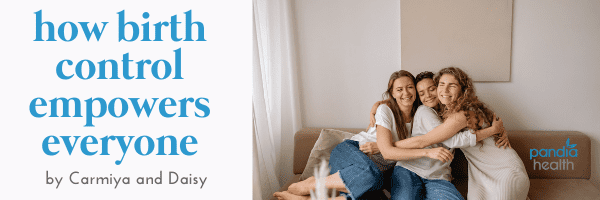Medically reviewed by Sophia Yen, MD, MPH – Written by Pandia Health Editorial Team
It is International Girls Day, and what better way to celebrate than talking about birth control and feminism?! Before we dive into talking about gender equality and women’s health, let’s discuss something a little crazy: for years, women had little to no control over their fertility.
In fact, birth control has only become accessible within the past century, and comprehensive sex education is still lacking. There have certainly been both advancements and setbacks concerning contraception, but factors like race, mobility, age, and income continue to impact one’s ability to get affordable and effective contraception.
International Girls Day is about celebrating the next generation of female leaders. Started by the Kappa Delta sorority , this day is about letting it be known that girls of all different races, abilities, interests, religions, and socioeconomic backgrounds can do anything they set their minds and hearts to.
Let’s help uplift tomorrow’s female leaders with the mantra “she can do anything.” Join Pandia Health in inspiring young women and girls to found their own company, be an inventor, run for president, or chase whatever dreams they may have.
Reproductive Health + Responsibility
Think about it: men essentially have five birth control options — condoms, abstinence, vasectomy, withdrawal, and outercourse; women have female condoms, tubal ligation, the diaphragm, the cervical cap, Plan B/ella, spermicidal jellies/foams, the sponge, outercourse, abstinence, the IUD, and the birth control pill, patch, ring, shot, and implant. While it’s beneficial that women have so many forms of contraception to choose from, the bulk of the responsibility concerning birth control continues to fall onto the woman herself.
Women continue to perform more domestic tasks than men and often must compromise their careers to take on childcare duties. Thankfully, birth control allows women to gain more control over when and if they wish to start a family and even when to turn off their periods. That said, it is still usually up to the woman to locate the resources to help her get contraception in the first place.
Since most birth control methods are made exclusively for people with uteri, the latter are the ones who most likely pay for them. While insurance companies are obligated to cover birth control under the Affordable Care Act, certain brands still require a copay, and without insurance, contraception can be pretty pricey.
That’s why services like Pandia Health exist — we take all insurances except Kaiser and TRICARE and deliver up to a year’s supply of birth control to your front door for FREE (including cool swag items and treats)! Plus, our birth control pill packs cost as low as $15 for generic brands without insurance.
What’s more, consistently focusing on how women should be preventing pregnancy without addressing the role men play further stigmatizes women when unplanned pregnancies do happen. So, we must make sure everyone bears equal responsibility in the sexual arena — sex is for everyone, and birth control should be too!
Birth Control = Empowerment
Birth control gives people with uteri more sexual agency and freedom, and allows them to control their bodies, thus moving everyone toward a more gender-equitable society. Although birth control was approved as a contraceptive method in 1960, it was not until the United States Supreme Court (SCOTUS) case Griswold v. Connecticut that solidified birth control as a constitutional right for married couples. What’s more, it took until 1972 for SCOTUS to recognize that unmarried people have the same right as married folks to obtain birth control.
Having access to birth control allows women to embrace their sexuality and sexual desires without the stress of having children. Consequently, back in the 1960s and 1970s, this also helped expand women’s career paths past being child bearers and housewives.
Thankfully, times have changed. Pandia Health helps make birth control attainable by delivering the pill, patch, and ring to anyone who has access to the internet and a mailbox. Taking birth control and having the ability to do so is a significant accomplishment and a step in the right direction for women’s liberation. While not all women are comfortable shouting about birth control and periods from the rooftops, by normalizing and fighting for birth control, we are on the right path.
Empowered by Pandia Health
Birth control should be liberating, not limiting, for everybody. Given the variety of options out there, every person who chooses to take birth control should know that there is a method out there for them. Just because the implant works for your friend, doesn’t mean that you can’t give the pill a try – and you might want the freedom to make your #PeriodsOptional by skipping the week of sugar pills in your birth control pack.
Overall, we still have a long way to go in achieving gender equality, especially when it comes to reproductive health. Fortunately, Pandia has got your back with safe, easy, and affordable access to birth control — join the Pandia Health community to make sure you never run out of birth control and to continue the fight for reproductive justice!
Disclaimer: The above information is for informational purposes only and is NOT a substitute for professional medical advice. Always seek the advice of your doctor/primary care provider before starting or changing treatment.

